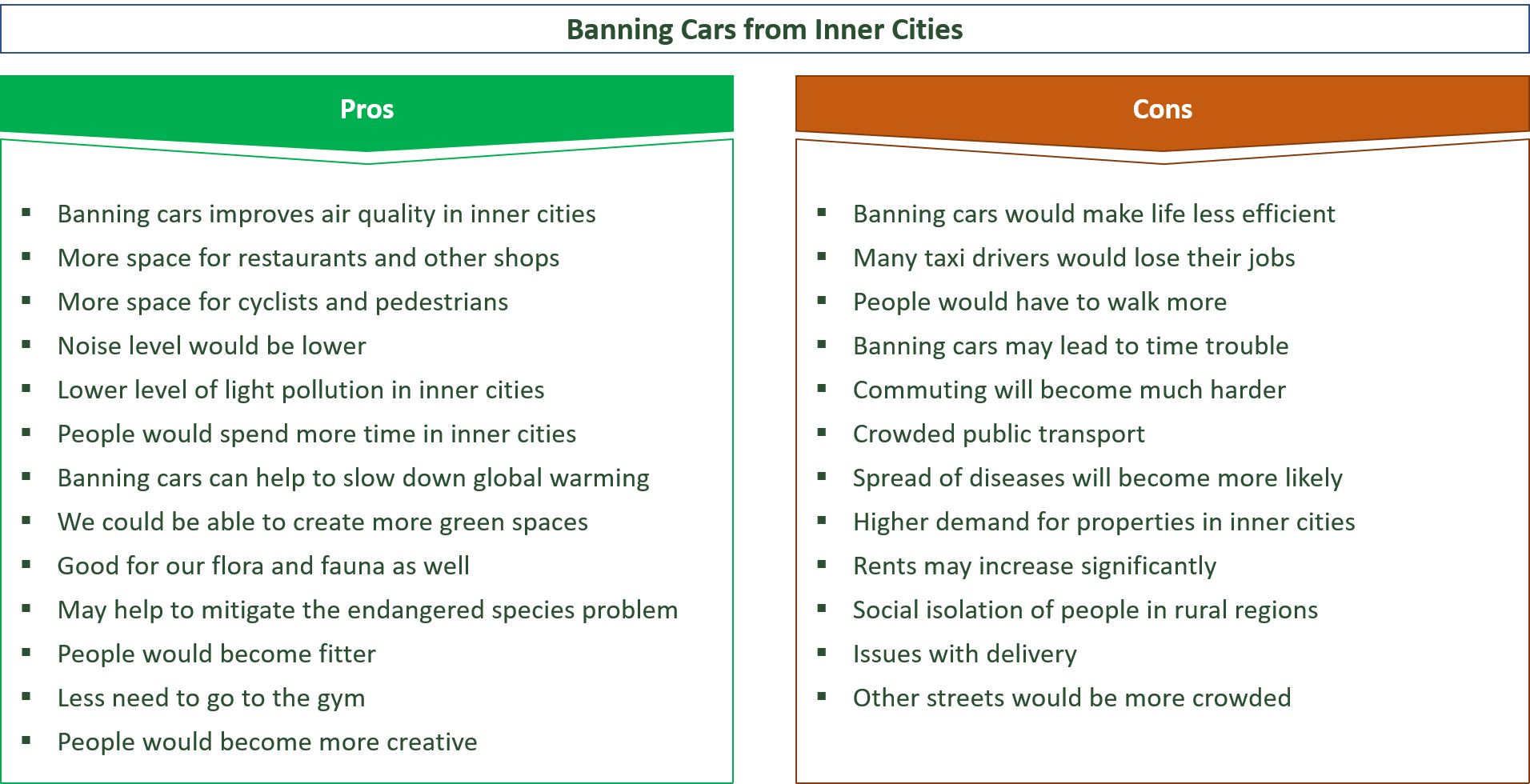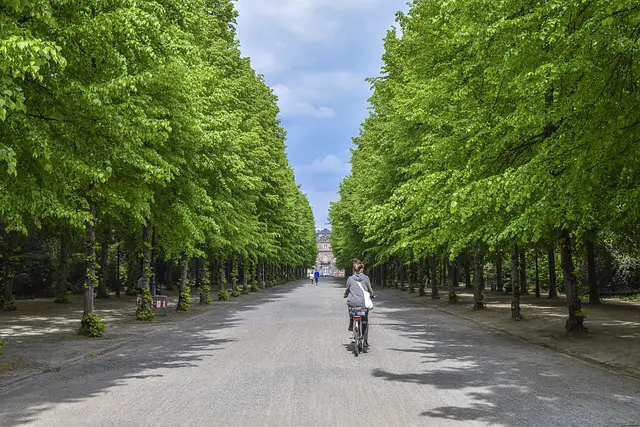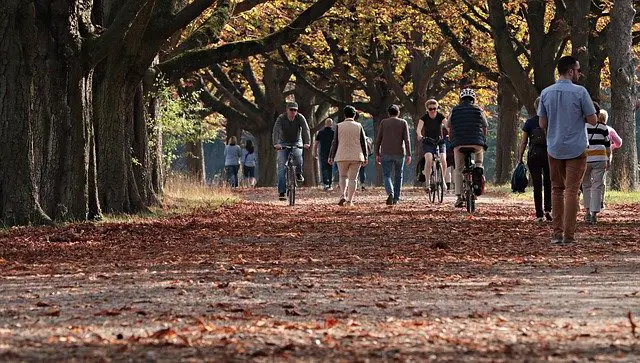“I’d be quite happy if cars were banned from central London. Why are we not using little tuk-tuks rather than big black cabs?”
Ben Fogle, Writer
Pros and Cons of Banning Cars

Numerous municipalities around the world think about banning cars from inner cities.
While a car-free inner city would improve air quality and would have many additional beneficial effects, there are also many problems with banning cars from inner cities.
In fact, I show you all the pros and cons of banning cars from inner cities in the following chapters.
Contents
Advantages of Banning Cars from Inner Cities
- Banning cars improves air quality in inner cities
- Pulmonary diseases for residents of inner cities would be less likely
- More space for restaurants and other shops
- More space for cyclists and pedestrians
- Noise level would be lower
- Lower level of light pollution in inner cities
- People would spend more time in inner cities
- Banning cars can help to slow down global warming
- We could be able to create more green spaces
- Good for our flora and fauna as well
- May help to mitigate the endangered species problem
- People would become more aware of the importance to protect nature
- More children could play outdoors
- Banning cars from cities may increase safety on our streets
- New business opportunities
- Banning cars encourages investments in green technology
- People would become fitter
- Less need to go to the gym
- People would become more creative
- People would likely spend more time together
Banning cars improves air quality in inner cities
One advantage of banning cars is that it would greatly improve air quality in inner cities.
We all know that conventional cars emit significant amounts of fine particles and other problematic substances into the atmosphere.
Thus, until electric cars become the standard, we can do ourselves a favor by banning cars from inner cities to avoid all the unpleasant issues that come along with poor air quality.
Pulmonary diseases for residents of inner cities would be less likely
Poor air quality is not only annoying since it significantly lowers our quality of life, but it can also be risky to live in a region with poor air quality.
For instance, people who live in inner cities with poor air quality are at much higher risk of suffering from serious pulmonary diseases like asthma or even lung cancer.
Consequently, by banning cars from inner cities, we could protect residents who live in those inner cities and also increase their quality of life at the same time.
More space for restaurants and other shops
If we have no cars in inner cities anymore, there would be much more space for different kinds of shops.
We could just use a fraction of the additional space and make it available to restaurants where people can sit outdoors during cozy summer evenings.
We could also allow additional shops to sell all sorts of nice things or use the additional space for markets.
Opportunities are almost endless in this regard and more space in inner cities is always a good thing since the more space you have, the more nice things you can provide for people who live or spend time in those areas.
More space for cyclists and pedestrians
Another benefit of banning cars from inner cities is that also pedestrians and cyclists would have much more space.
Imagine a world without cars in inner cities.
You would no longer have to care about being hit by a car. Instead, you could walk wherever you want and enjoy nice walks through the inner city.
This would also make cycling and walking much more attractive and people would likely use their feet for smaller distances compared to just using their car and hurting the environment as they do it in our current state of the world.
Noise level would be lower
You should also not underestimate the noise level that comes from the use of conventional cars.
In fact, most of the noise in inner cities often comes from car traffic and if we ban cars from inner cities, this noise would be gone immediately.
Thus, people could enjoy a much quieter atmosphere and inhabitants would also be able to sleep much better during the night due to the lower noise level in their neighborhood.
In turn, many people would wake up more relaxed in the morning and chances are that those people would also be in a better mood.
Consequently, the risk of conflicts would be lower as well.
Lower level of light pollution in inner cities
Another upside to car-free inner cities is that we could also avoid significant light pollution.
Especially in the evening and during nighttime, cars will need to turn on their lights so that drivers will be able to navigate through traffic in a safe manner.
However, those lights can be quite annoying, especially for people who live near those streets and who may wake up in the middle of the night and may no longer be able to fall asleep anymore.
People would spend more time in inner cities
Without cars in inner cities, people would likely also spend much more time in inner cities.
If you don’t have to worry about cars that run you over, it will just be much more convenient to spend your time in nice places of your favorite city.
In turn, people would also be more willing to buy things in small shops and more of those small shops would be able to compete with big online retailers.
Hence, banning cars from inner cities may also help the local economy to a certain extent, even though it might also imply some issues in this regard.
Banning cars can help to slow down global warming
By banning cars from inner cities, we would also be able to slow down global warming to a certain extent.
If people use their cars less often and people use public transport or alternative means of transportation, fewer greenhouse gases will be emitted into our atmosphere and this means that the climate change issue can be mitigated.
Sure, we cannot save our environment solely by banning cars from cities.
However, it would be one important step towards an eco-friendlier way of life and small positive actions eventually add up to a big impact.
We could be able to create more green spaces
Banning cars from inner cities would also imply that we would be able to create more green space like parks or playgrounds.
In many inner cities, a lack of green spaces is a serious problem since people will not be able to regenerate and unplug from their stressful lives in those places.
Hence, by creating those additional spaces, chances are that people in inner cities would be better able to relax and that our society would become more relaxed in general.
Good for our flora and fauna as well
Banning cars from inner cities cannot only have many positive effects on us humans, but it can also have many beneficial effects on the local flora and fauna as well.
If there are fewer cars around, animals would get more living space and more smaller animals would populate the city.
I personally really love seeing squirrels and other small pets when I walk down the streets since it is the small things that make our lives interesting and exciting and we should really enjoy those small things of life more in my opinion.
May help to mitigate the endangered species problem
Since animals would have more living space by banning cars from cities, many species that are currently endangered may no longer be endangered in the future since they would be able to reproduce in a better manner.
Consequently, we would be able to mitigate the endangered species problem in the long run and this could also lead to a better ecological balance in general.
People would become more aware of the importance to protect nature
If we ban cars from inner cities, people would also become much more aware of our environmental issues and why it is important that everyone of us makes a contribution in this regard.
Right now, there are still far too few people who really care about our planet.
However, by banning cars, more people would think about those issues since those measures would directly affect how their daily lives would look like.
More children could play outdoors
If we are able to get a car-free inner city, more children would also be able to play outdoors in the streets instead of just sitting at home and watching TV or playing video games.
This can be quite beneficial for kids since they will be able to socialize more and will also be able to make many more friends in the long run.
Banning cars from cities may increase safety on our streets
In general, banning cars can also have a significant positive effect on the safety of our streets.
Fewer cars just means that there are fewer occasions where people could get involved in serious car accidents.
In turn, chances are that the number of traffic accidents would decrease significantly and also that the life expectancy of people who spend lots of time in inner cities would increase.
New business opportunities
Since people still have to get around in inner cities even when cars are prohibited, there will be many new business opportunities.
We already see some of them.
For instance, instead of using their cars, people could use electric scooters for short distances.
In turn, banning cars from cities gives people who are passionate about our environment the chance to enter those markets and to get funding for their projects.
Banning cars encourages investments in green technology
In general, by banning cars, investors around the world get a much bigger incentive to invest in green technologies since they will see a much bigger chance to get a nice return on those green investments.
Consequently, we may also be much faster in developing green technologies that could potentially save our planet by banning cars and providing subsidies to companies who want to make the world better in this regard.
People would become fitter
Since people would use their bicycles more often and would also walk short distances instead of using their cars, they would likely also become much fitter.
As we all know, overweight and obesity are a serious problem in our Western world and by banning cars from inner cities, more people would be able to lose weight in a natural manner.
Less need to go to the gym
Many of those people would also no longer need to go to the gym since they would simply exercise more during the day in a natural manner and would not have to spend their leisure after work in those artificial environments.
Consequently, people would have more time to spend with their families and do things they like more than going to the gym.
People would become more creative
Sure, there are also some issues with banning cars from inner cities.
However, this also gives people the opportunity to become more creative and to find ways to overcome those issues.
Progress is always caused by dissatisfaction and only if people face challenges, we as humanity can really learn and progress in the long run.
People would likely spend more time together
If we ban cars from inner cities and therefore create more space where people could spend their time outdoors, chances are that people would simply also spend more time together.
Imagine a cozy summer evening.
Would you rather want to sit at home inside your four walls or enjoy a nice glass of wine in your favorite spot in your town?
I think many people would go for the second option and this also contributes to better social cohesion since people will just talk to each other more in person instead of just writing on messenger services or doing video calls.
As you can see, there are indeed many advantages of banning cars from inner cities.
Yet, it is not all upside and we also have to talk about the negative aspects related to it.
Thus, I will also show you all the downsides to banning cars from cities in the following.

Disadvantages of Banning Cars from Inner Cities
- Banning cars from inner cities would make life less efficient
- Many taxi drivers would lose their jobs
- People would have to walk more
- Banning cars may lead to time trouble
- Commuting will become much harder
- Crowded public transport
- Spread of diseases will become more likely
- Higher demand for properties in inner cities
- Rents may increase significantly
- Social isolation of people in rural regions
- Issues with delivery
- Other streets outside the inner city would be more crowded
Banning cars from inner cities would make life less efficient
One problem with banning cars from inner cities is that it would make our lives just less efficient.
People would no longer be able to get from A to B in a short period of time.
Instead, they may have to walk certain parts and this also means that they will lose time on average.
It may also become more complicated to get to certain places, especially in cities where public transport is quite bad.
Hence, cities that currently struggle with providing decent public transportation should fix this issue first before thinking about banning cars.
Many taxi drivers would lose their jobs
You should also not underestimate the negative effect banning cars from cities can have on cab drivers.
If taxis are no longer allowed to enter inner cities, many cab drivers would just no longer be needed and many of them would struggle to find a new job.
In turn, unemployment rates may increase due to car-free cities.
People would have to walk more
While some people really like walking and experience the city, others just don’t like it at all.
Especially if you are in a rush and have to be on time for an appointment, it can be extremely frustrating having to walk longer distances, especially if you wear shoes that are not suitable for it at all.
Consequently, some groups of people may also be really annoyed and disappointed if you take away the opportunity to go to work in inner cities by car.
Banning cars may lead to time trouble
In general, in our current state of the world, most people still rely on their cars to get to work and back.
If you take away this option, people would have to find alternative means of transport to get to work and back.
Especially in the beginning, this might lead to serious issues since many people would not be able to plan appropriately and this would lead to a state where many people would come late to work.
Some of those people might even get fired due to that.
Commuting will become much harder
Especially if you don’t live in the city center and have to commute for an extended period of time every day, chances are that banning cars from inner cities would make your commute much harder.
You would have to park your car somewhere outside the inner city and would have to take the metro or other means of public transport to get to work.
However, chances are that this would take additional time for commuting and this can be really annoying, especially if you already have to spend many hours commuting right now.
Crowded public transport
If fewer people use their cars, it is just logical that more people will use public transport.
While this might not be a problem in areas where public transport systems are quite good, it can lead to serious issues in areas where this is not the case at all.
In those areas, trains or buses may become pretty crowded and it may become really inconvenient to use them.
Spread of diseases will become more likely
Since more people will use public transport, it also means that the spread of diseases will become more likely since people will stand closer together and there will simply not be enough space between each other anymore.
In turn, also the risk of epidemics or even pandemics will increase.
Higher demand for properties in inner cities
If commuting becomes more difficult through the ban of cars in inner cities, chances are that also property prices in inner cities would increase significantly.
In turn, fewer people would be able to afford to live in those inner cities and only people who make good money would be able to do so.
Rents may increase significantly
Not only property prices would increase, but also rents would increase as well since more people would want to live directly in the city, especially if their workplace is located in the inner city.
In turn, many people who currently live there would have to move out since they would simply no longer be able to pay those high rents.
Social isolation of people in rural regions
Banning cars from cities may also be a serious issue in case you live in rural areas of our planet.
In fact, people in those regions are often highly dependent on their cars and need it for various parts of their lives.
If you don’t allow those people to drive to inner cities anymore, they will often just be helpless and may no longer know how to manage their lives.
Issues with delivery
If we don’t allow delivery drivers to enter inner cities anymore, chances are that our production chains would suffer quite a bit and may also eventually break down in the long run.
In turn, we would have to wait for our parcels much longer and also the selection of goods we can buy in shops would be more confined.
Other streets outside the inner city would be more crowded
If people are no longer allowed to drive inside the inner city, more people would drive on the streets outside inner cities.
In turn, those other streets would become more crowded and traffic jams would become more likely due to those substitution effects.

Top 10 Banning Cars Pros & Cons – Summary List
| Car-Free Cities Pros | Car-Free Cities Cons |
|---|---|
| Additional space for shops | Banning cars makes life less efficient |
| People would have more space to hang out | People would be less flexible |
| Better air quality in inner cities | People may be late to meetings |
| Lower level of noise pollution | Would make our lives more complicated |
| Banning cars can mitigate global warming | Hard in areas with poor public transport |
| People would behave eco-friendlier | Commuting may take longer |
| Positive effects on flora & fauna | Increase in property prices |
| May improve the safety on our streets | Increase in rents in inner cities |
| New business options | Delivery issues |
| Bigger incentive to invest in green tech | Distribution chain may break down |
Is Banning Cars From Inner Cities A Good Idea?
As you can see from the previous analysis, there are many advantages and disadvantages of banning cars from inner cities.
While it is a good idea to ban cars from inner cities in my opinion, there should also be some exemptions from this rule to keep our production and delivery chains running so that we can still profit from a high quality of life while doing good for the planet at the same time.
Sources
https://www.bbc.com/future/article/20191011-what-happens-when-a-city-bans-car-from-its-streets
https://www.theguardian.com/politics/2020/jan/07/banning-cars-alone-is-not-the-answer
https://citymonitor.ai/transport/ban-cars-why-cities-are-embracing-the-call-for-car-free-streets

About the author
My name is Andreas and my mission is to educate people of all ages about our environmental problems and how everyone can make a contribution to mitigate these issues.
As I went to university and got my Master’s degree in Economics, I did plenty of research in the field of Development Economics.
After finishing university, I traveled around the world. From this time on, I wanted to make a contribution to ensure a livable future for the next generations in every part of our beautiful planet.
Wanna make a contribution to save our environment? Share it!